Description :

Synthesized is a two day festival celebrating the computer and synthesiser - and how the two technologies grew up together.
The two technologies have crossed paths many times since the CSIRAC mainframe played the "Colonel Bogey March” in 1951. The mighty Fairlight CMI, the PPG and the humble Dragon 32 both share the same processor - as do the Moog Source, Prophet-5 and the ZX Spectrum.
By 1990, the Atari ST found its way into almost every recording studio. Technologies from the flagship Yamaha DX7 and Roland D-50 found their way into almost every PC sound card of the 1990s. Today, modern computers can emulate almost any classic synthesiser with near perfect accuracy.
Without computers we wouldn’t have FM, wavetable, additive and phase distortion synthesis - or even be able to save the sounds on our analog synthesiser.
Over the years we've were lucky enough to have a Fairlight CMI, a PPG Waveterm and a Greengate DS4 together in the same room. We even had Colin Holgate from Greengate and John Molloy from 80s band Mainframe to demonstrate it to us.
This year will be even bigger, even better, even noisier and will have more wonderful synthesisers for everyone to see and use. Check out our current exhibitor list - and keep checking back as there's more to be added!
EXHIBITORS
Pro Synth Network
Returning this year under the banner of his Pro Synth Network YouTube channel, music technology journalist Rob Puricelli will be bringing another eclectic mix of synthesizer hardware for your delectation and delight!
With the help of Peter James-Stephen, the main focus of this year’s exhibit is the 40th anniversary of the legendary E-MU Emulator II digital sampler. Peter will be bringing his considerable Emulator collection, including the Sound Designer software for sample editing. We will have one of every Emulator made, from the first to the final software-only version, plus other related instruments, such as the EMAX II.
In addition to the E-MU exhibit, Rob will be bringing some other synths, both old and new. You will have a chance to see and play Frankie Goes To Hollywood’s Roland JUNO-106, used by the band in the writing and recording of their second and final album, ‘Liverpool’. There will also be a chance to witness the very latest analogue synthesis technology with the brand new Arturia PolyBrute 12.
Pro Synth Network: https://www.youtube.com/@ProSynthNetwork
Facebook/Instagram/X: @ProSynthNetwork
Dr. Alan Ip
Musician/Music Producer, Vintage Synth DIYer/Collector, University Lecturer, Principal Program Manager and Director of Cloud & AI
Dr. Alan Ip will showcase two vintage ARP 2600 synthesizers, one grey (1971) and one orange (1978), renowned for their rich sound and versatility. The ARP 2600, a semi-modular analog synthesizer, has been a favorite among major artists such as Stevie Wonder, Jean-Michel Jarre, Herbie Hancock, Daniel Miller, Depeche Mode, and Vince Clarke. Its unique design combines the flexibility of modular synthesis with the convenience of pre-wired functionality, making it both powerful and user-friendly.
The grey ARP 2600, from 1971, is known for its smoother and warmer sound, while the orange ARP 2600, from 1978, features a more aggressive and cutting tone, along with improved reliability and slight circuit enhancements. Dr. Ip’s presentation will demonstrate the integration of these vintage synthesizers with digital audio workstations (DAWs) and the modern hardware sequencer, showcasing how contemporary tools can enhance and expand the capabilities of classic analog equipment.
Eduardo (Eddie) Garcia-Nava. AKA: FRose.
Newbie Synthesist and collector, will be sharing with us his full collection of ROLAND JV products: 80; 30; 880; 1000; 90;1080; 35; 50; 2080; 1010; All 19 wave expansions; all 7 PCM expansions; all 7 patch expansions and all 3 Voice expansions.
Mitch Johns (Hack Modular)
Mitch will be experimenting with how synthesizers and 1940s cipher machines can plug into each other. Translating encrypted teleprinter text to tones and melodies.
Peter James-Stephen - Emu Systems Enthusiast & Former Director of
Athena Music Systems
From 1987 Peter’s recording project “The Final Demand” recorded 5 albums using synthesizers and especially “Emu Samplers” beginning with the mighty Emulator 2 and progressing to the 3 and then 4.
in 2003 when Emu Systems discontinued their EOS rack mount samplers in favour of a windows based software version, with the help of Emu Systems Scotland, Peter designed the worlds first dedicated 2 unit rack mount music computer incorporating the Emu 1212m cards. “The Athena Systems Vampire Rack” running the Emulator X Sampler.
This year he’ll help us celebrating the 40th anniversary of the iconic Emulator 2 by bringing his Emulator Collection Including a Emulator 2, Emulator 3, Emulator 4, Vampire Rack Running Emulator X , Atari ST 4meg running the very first sampler for the system from 1986 the IS Digitiser and a Mac Classic running Sound Designer.
Bob Pearson
Saturday only
Bob was responsible for originating & developing Cheetah keyboards, synthesizers, samplers and drum machines.
They were UK designed & built in the 1980s & 90s by talented designers such as Ian Jannaway (later of Novation), Mike Lynch & Richard Gaunt (later of Autonomy), Chris Wright (later of Soundscape), and used by top bands including OMD, The Christians, The Timelords, The KLF, Status Quo, Simply Red, Yes, and many more.
Bob also programmed many of the preset sounds in the Cheetah MS6 Analogue Multi-timbral synthesizer module, and even managed to program several preset sounds into the Cheetah MS800 digital wave synthesizer, as subsequently showcased by Aphex Twin on his Cheetah EP, which was a 2016 US Dance #1.
Bob aims to be displaying the pre-production Cheetah MS6 synthesizer prototype, an original Cheetah MK5 MIDI keyboard controller, and his Roland Jupiter 6 synthesizer which was inspiration to produce the Cheetah MS6 multi-timbral analogue rack-mount synth, for a fraction of the cost.
Bob also presents a weekly radio show live on BigglesFM 104.8 every Wednesday night.
Live stream: http://uk1.internet-radio.com:8092/bigglesfm
Twitter: @Bob_P_DJ
Tony Jewell (@herebedragons3)
80s and 90s synth enthusiast Tony will be bringing his state of the art (for 1991!) Roland Computer Music System - cutting edge at the time, now almost completely forgotten. He'll also be demonstrating how the iconic Atari ST can still be used in a modern environment.
Pete Catley
Pete is a long-time sufferer of chronic GAS (Gear Acquisition Syndrome), a common condition in the synthesiser world.
He has a particular penchant for drum machines and electronic drums, and hopes to demonstrate how they have evolved from simple non-programmable "boom-chick" organ accompaniment to full on sampled "better than real drums" creative machines that defined the music of the 80's right up to the present day. Serviceability permitting he will bring his Korg Minipops, KR-55B, Roland CR-78, Linn LM-1, LinnDrum, Oberheim DX, EMU Drumulator, SCI Drumtraks and Kawai R-100 (possibly some others too).
Matt Evans
Matt will be bringing a MIDI setup of a late 80s computer (suspense: depending which works!) with an Akai sampler plus modern 303/808 clones.
Jonathan “theJPster” Pallant
Saturday only
JP returns with his “History of PC Sound” exhibit, covering the story of PC audio from the PC Speaker, to the MP3. A MIDI keyboard and a section of games will show off the sounds of an original Soundblaster AWE64 as well as modern recreations of the legendary Roland MT-32 and Gravis Ultrasound.
Colin Piggot (@QuazarSamCoupe)
Saturday only
Colin started his computer audio journey after designing a soundcard for the SAM Coupe computer way back in 1995 - the "Quazar Surround" - which gives multichannel 8-bit and 16-bit digital sound to push it's audio capabilities dramatically. Also, what you may think is overkill for an 8-bit micro but is really a lot of fun, is that it featured surround sound outputs! Now in 2024 a revised version of the Quazar Surround is available, updating a classic with a more modern design. He will be demonstrating what the soundcard can do, along with the other sonic capabilities of the SAM Coupe - the built in SAA1099P FM sound chip as well as MIDI. An updated back issue of "SAM Revival" magazine will be available bundled with an audio CD to show everything sound related for the SAM Coupe.
Colin's tinkering with computer audio also expands to what he calls "8-bit gene splicing", namely taking the famous Commodore 64 SID sound chip and designing an interface back in 2003 to use it with the SAM Coupe. Despite the SAM being powered by the Z80 CPU there's enough processor time to emulate the Commodore 64's 6510 processor to allow real time SID music playback. In 2020 he also released a multi-platform version of his SID Interface for the RC2014 platform (& compatibles that feature an RC2014/RCbus expansion port, such as Feersum's MicroBeast).
Sheila Dixon
The SID ("Sound Interface Device") was designed for the 1982 Commodore 64 8-bit home computer. The designers went way further than they needed to for a home computer of the era and built a 'synthesizer on a chip' with three voices, each with a choice of four waveforms, ADSR, a filter and even ring modulation and waveform sync. Shiela will be bringing along her project 'the MIDISID Beast' which drives 6 SID chips and plays music with up to 18 SID voices at once! She'll also be bringing an original Commodore 64, set up as a 'SID jukebox' with music from many SID wizards including Rob Hubbard, Ben Daglish and Nordischsound.
John Newcombe (@GlassTTY)
John will be exploring the early days of MIDI. Expect to see an Apple II blasting out the Ultima V sound track using a Roland MT-32 Multi-Timbre synthesizer. In addition, John will be attempting to compose a tune or two on his 1984 Yamaha CX5M Music Computer, which should be interesting, as John would be the first to admit he is no musician.
Paul Wiffen aka The Synth Guru
Paul has been at the forefront of music technology since the 1980s. He started at EDP (creators of the Wasp and Gnat) and went on to found the Oxford Synthesiser Company with Chris Huggett, makers of the legendary OCSar monosynth. As a demonstrator for Elka, he created the laser harp sound for Jean-Michel Jarre and worked with Vangelis. In LA he did sessions for Stevie Wonder, Michael Jackson, Hans Zimmer and Mark Isham.
Back in the UK he worked with Mike Lynch at Cheetah developing samplers and developing on Atari's Falcon. These days he mainly directs feature films including one on Leonard Cohen's early years on Hydra in Greece and several teenage musicals but is always happy to attend synthesis and computing events to cement the late Chris Huggett's legacy as the greatest British synth designer of all time.
Alex Peverett & Adam Staff
Sunday only
Alex and Adam will be showing an Acorn/Hybrid Technology Music 500 synthesizer. Designed in 1984, the Music 500 is a hybrid hardware and software computer music system designed for synthesis and sequencing. In conjunction with a BBC Micro or Master microcomputer, the Music 500 operates via its unique computer music programming language AMPLE (Advanced Music Programming LanguagE).
They will also be showing two versions of the monome norns music computer (https://monome.org/docs/norns/). Currently in production in small batches from monome, and available in DIY form, norns is 'a small, portable, open-source sound computer that dynamically runs scripts and DSP (Digital Signal Processing)'. Running on Raspberry Pi, Supercollider and Lua, patches allow sampling, synthesis, sequencing - everything a music computer can do. The minimalist style, and a dedicated community on the lines forum (https://llllllll.co/), mean that sketches are often experimental, personal and specific.
Alex is an Electronic & Computer Music composer, multi-disciplinary artist and educator. He lectures in Music Technology and Electronic Music production, specialising in synthesis, audio-visual art, and programming languages for music. He has published electronic music on numerous labels and performed extensively throughout Europe and Japan. His studio practice unifies historical computer music methods and technologies, from the 1960s onwards, with contemporary tools, DIY electronics and synthesizers. He also works as a specialist technician at the Sussex Digital Humanities Lab, University of Sussex.
Adam Staff (https://adamstaff.github.io/) is a musician, technician and tinkerer. He is a Senior Technician-Demonstrator in the Music Department at the University of Sussex, installing and maintaining the department's specialist facilities including three recording studios and five production studios. Adam is in the early stages of a project researching and reviving forgotten musical interfaces for modern music production, starting with an Ondes Martenot 'ring and string' controller. He is also kept busy repairing and restoring tape machines, amplifiers and synthesisers.
Some of the technologies being shown form part of the Dead Tech Lib (https://deadtechlib.pubpub.org/), an active Media Archaeology collection at the Sussex Digital Humanities Lab, University of Sussex.
Mark Jenkins Kraftwerk 50
And to finish off the evening on Saturday, for the 50th anniversary of the Kraftwerk’s international breakthrough album “Autobahn”, music technology expert MARK JENKINS (“Tubular Bells for the Moog Synthesizer”, ”Dark Side of the Moon for the Moog Synthesizer”) presents a striking live solo performance of the band’s hits, music they never play, and music they might have played in some alternate future reality of computer graphics, vocoder vocals and artificial intelligence imagery. More details and ticket info here.
-----
And to get you all in the mood - here's some pictures from the previous events.
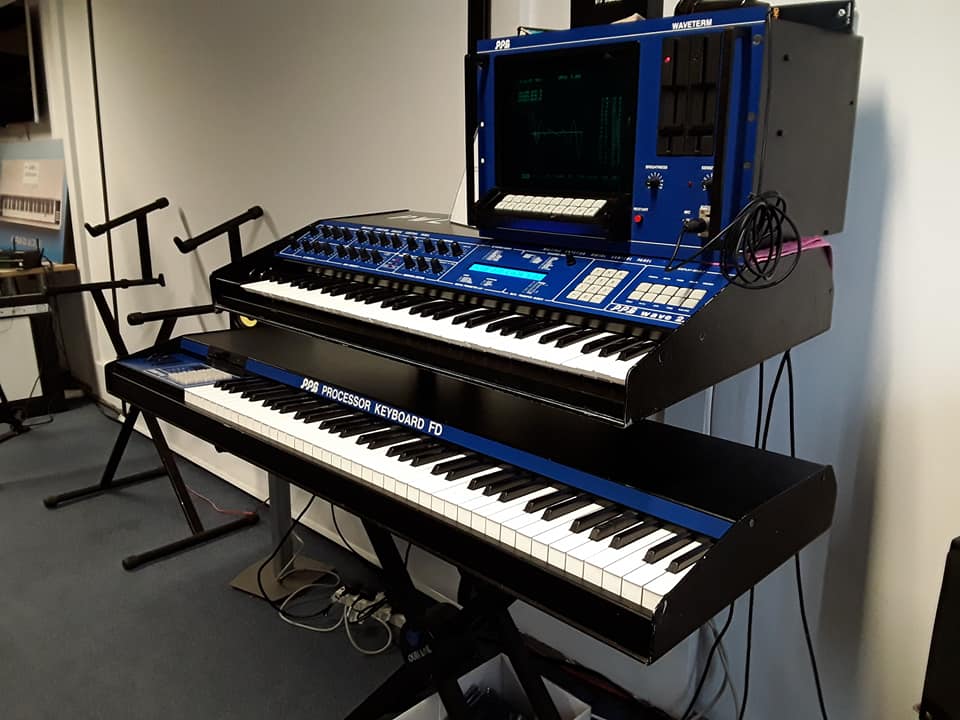
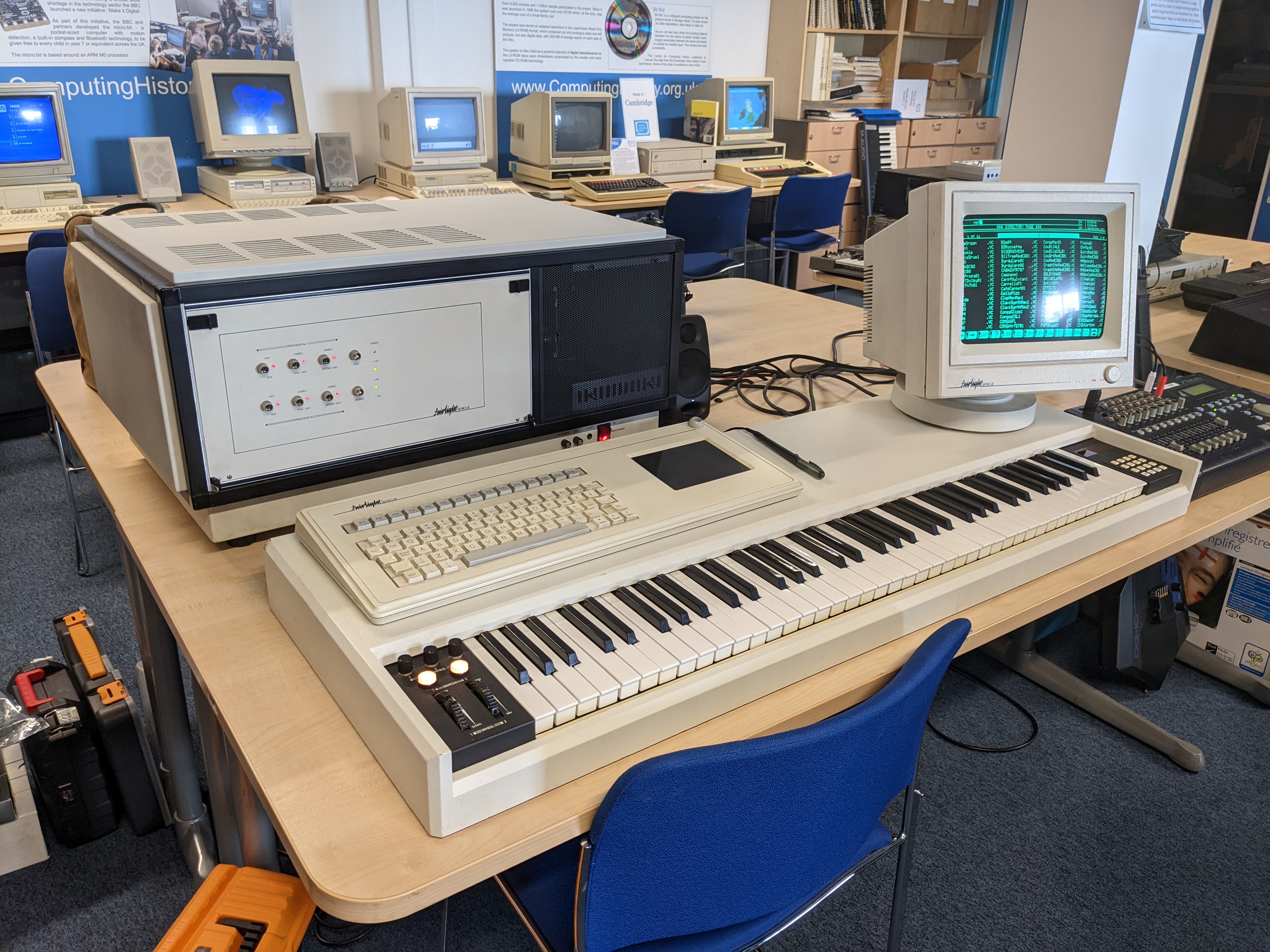
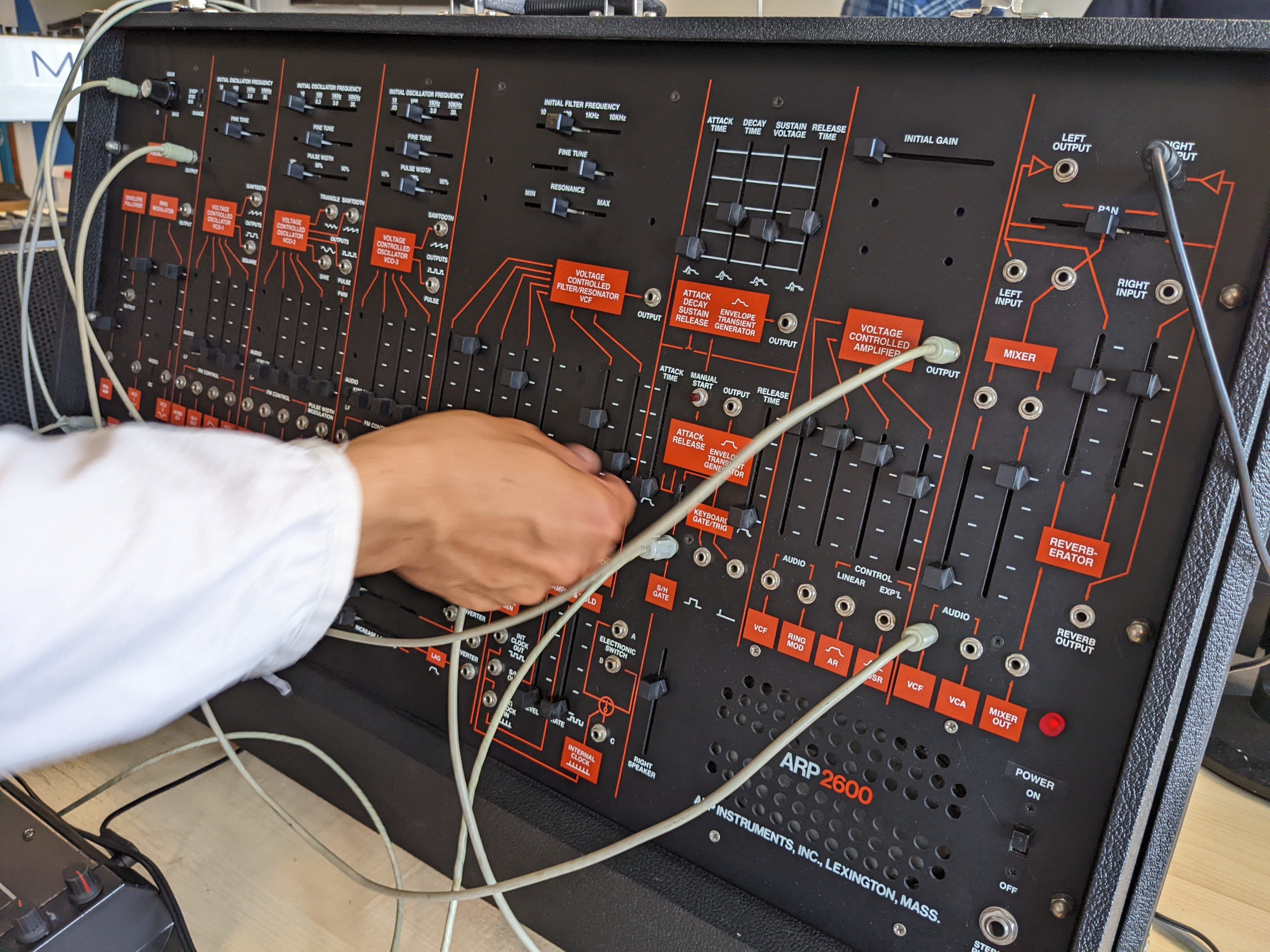
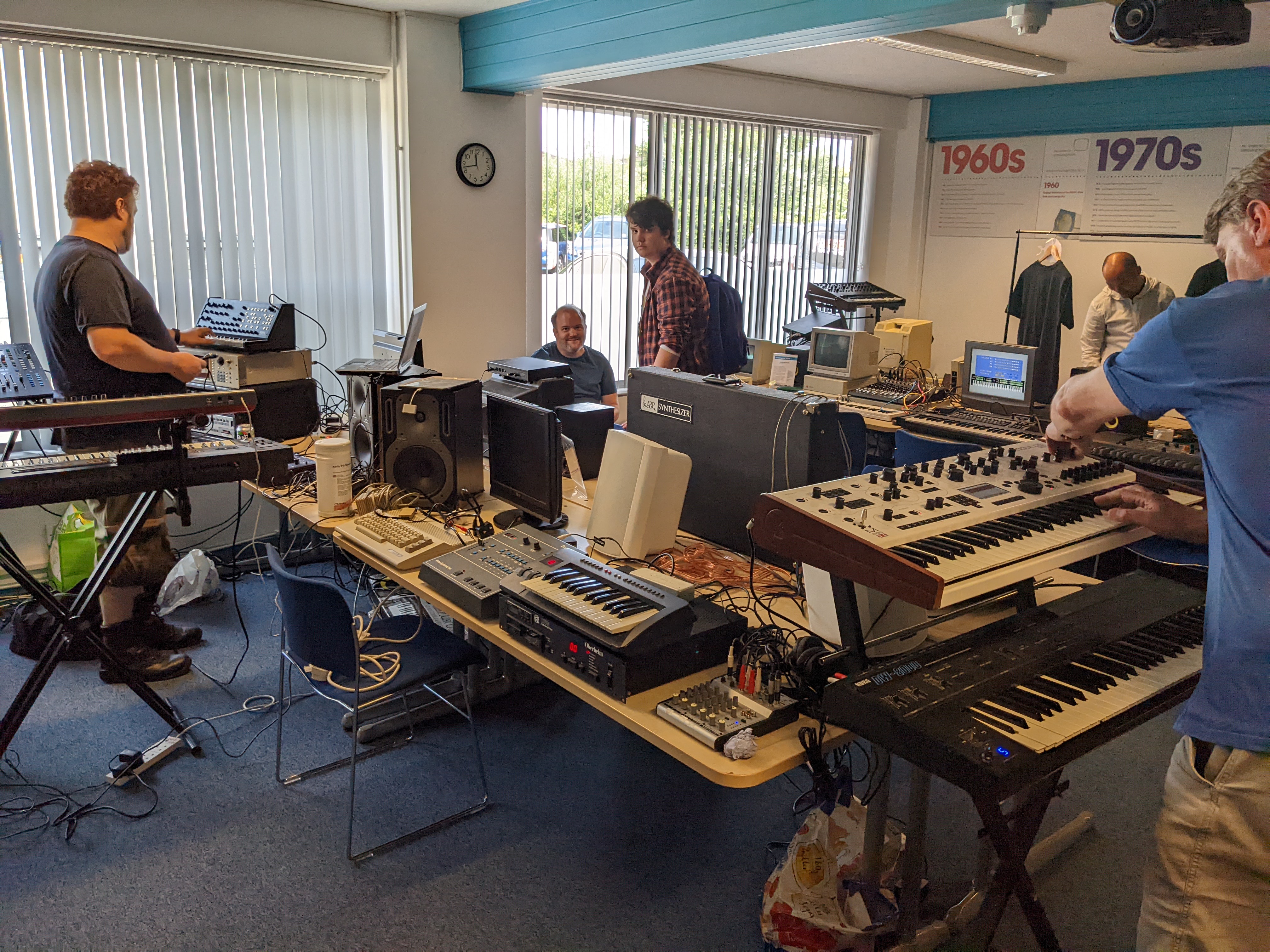
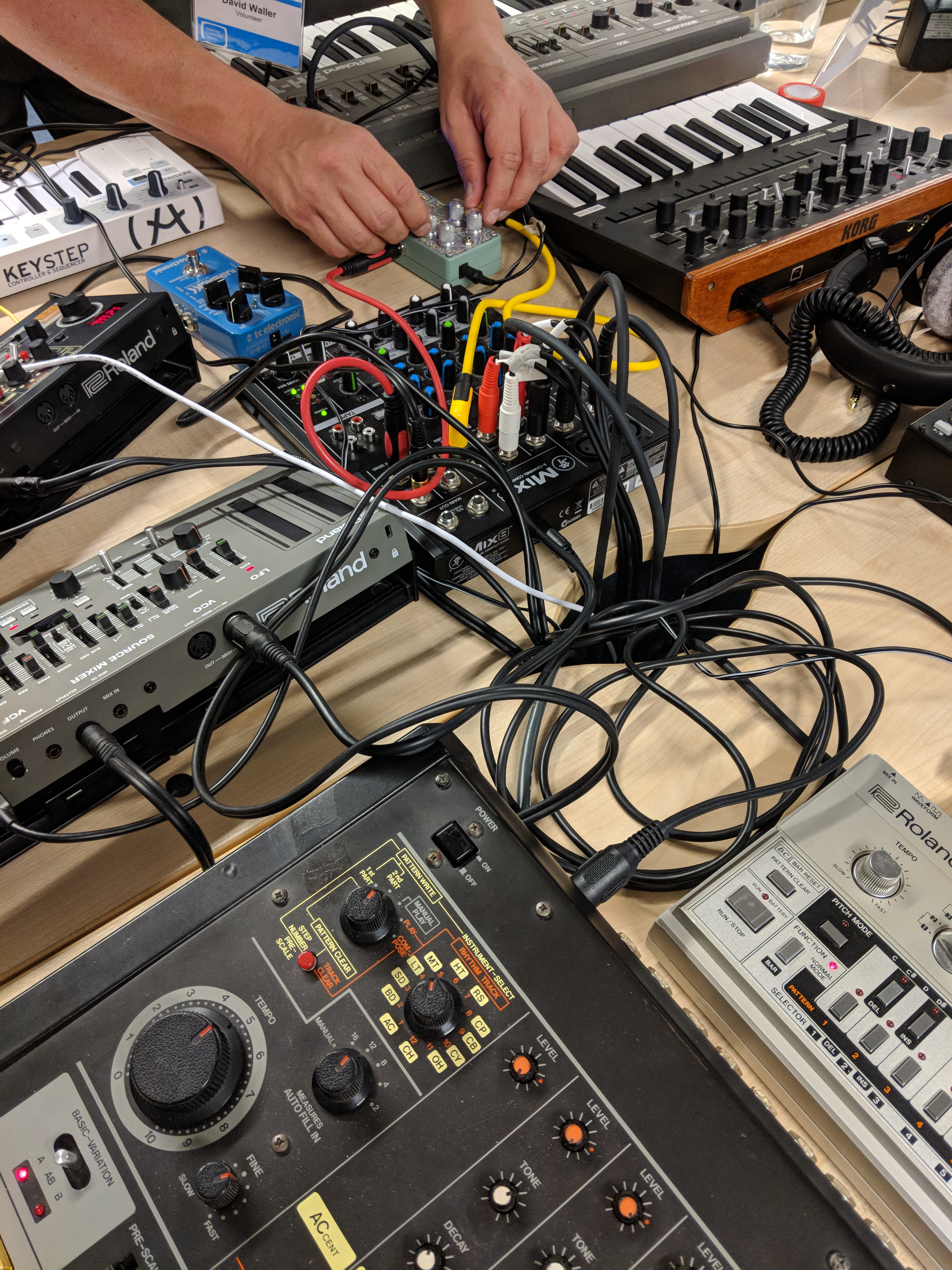
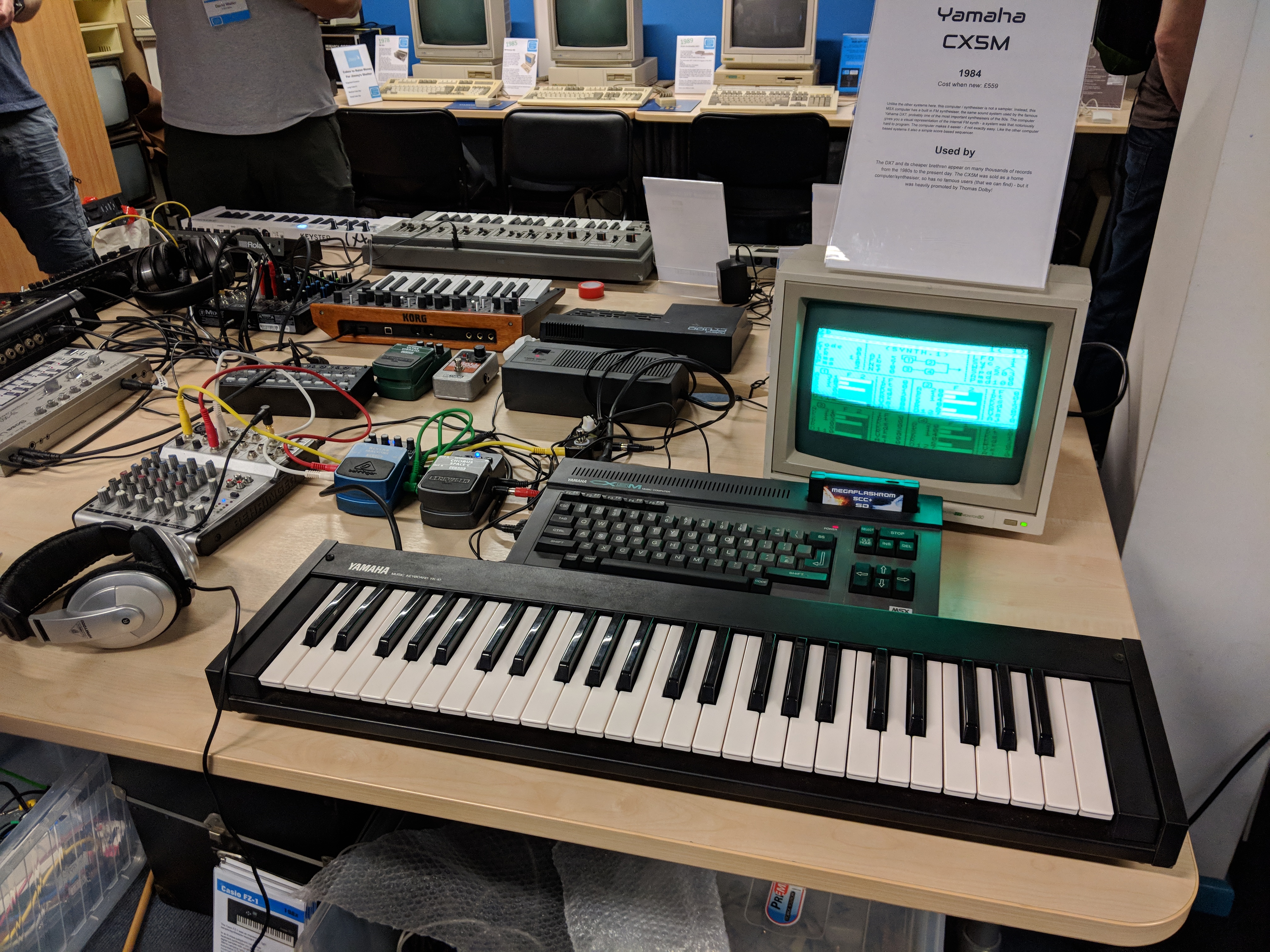
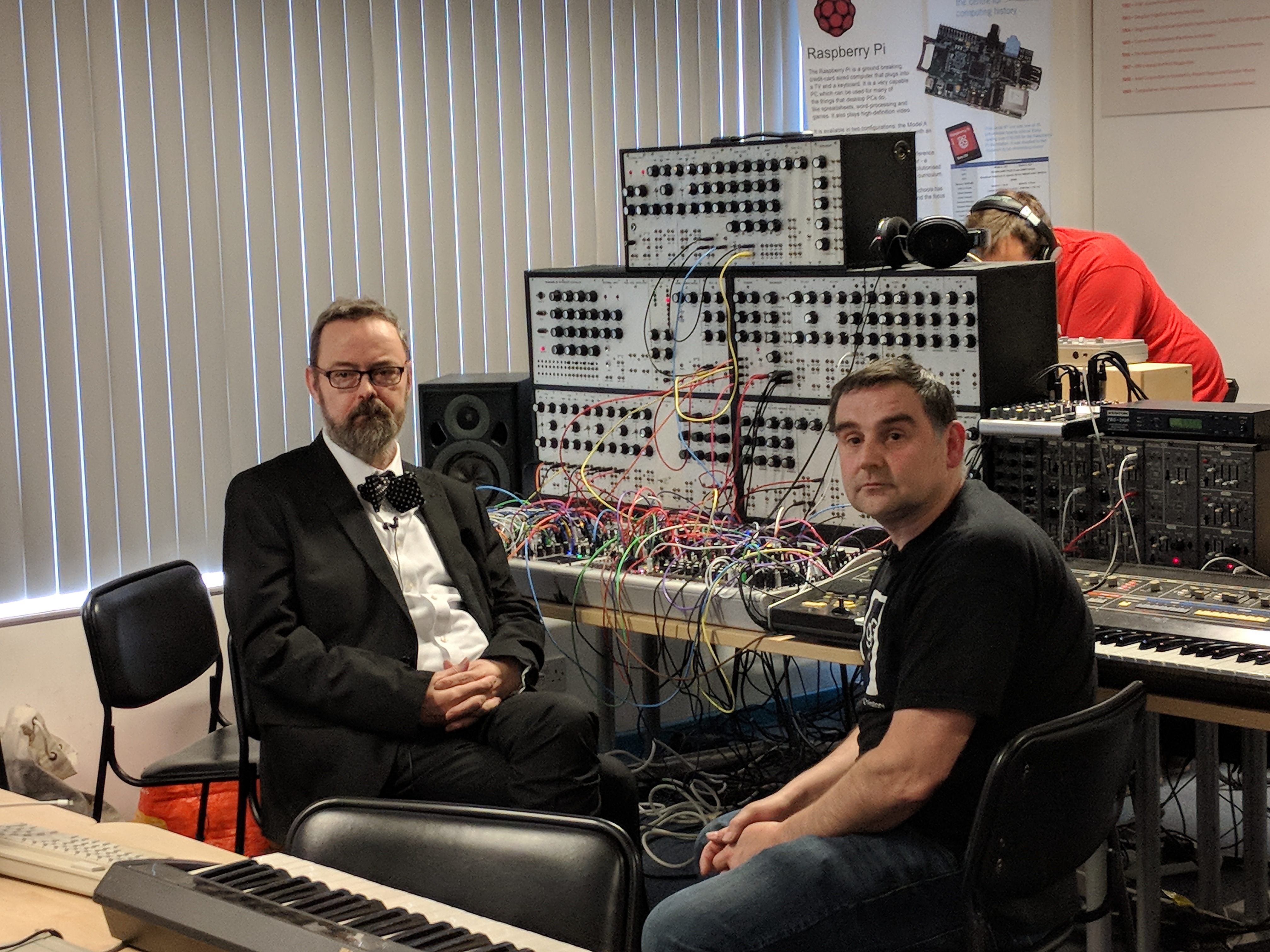
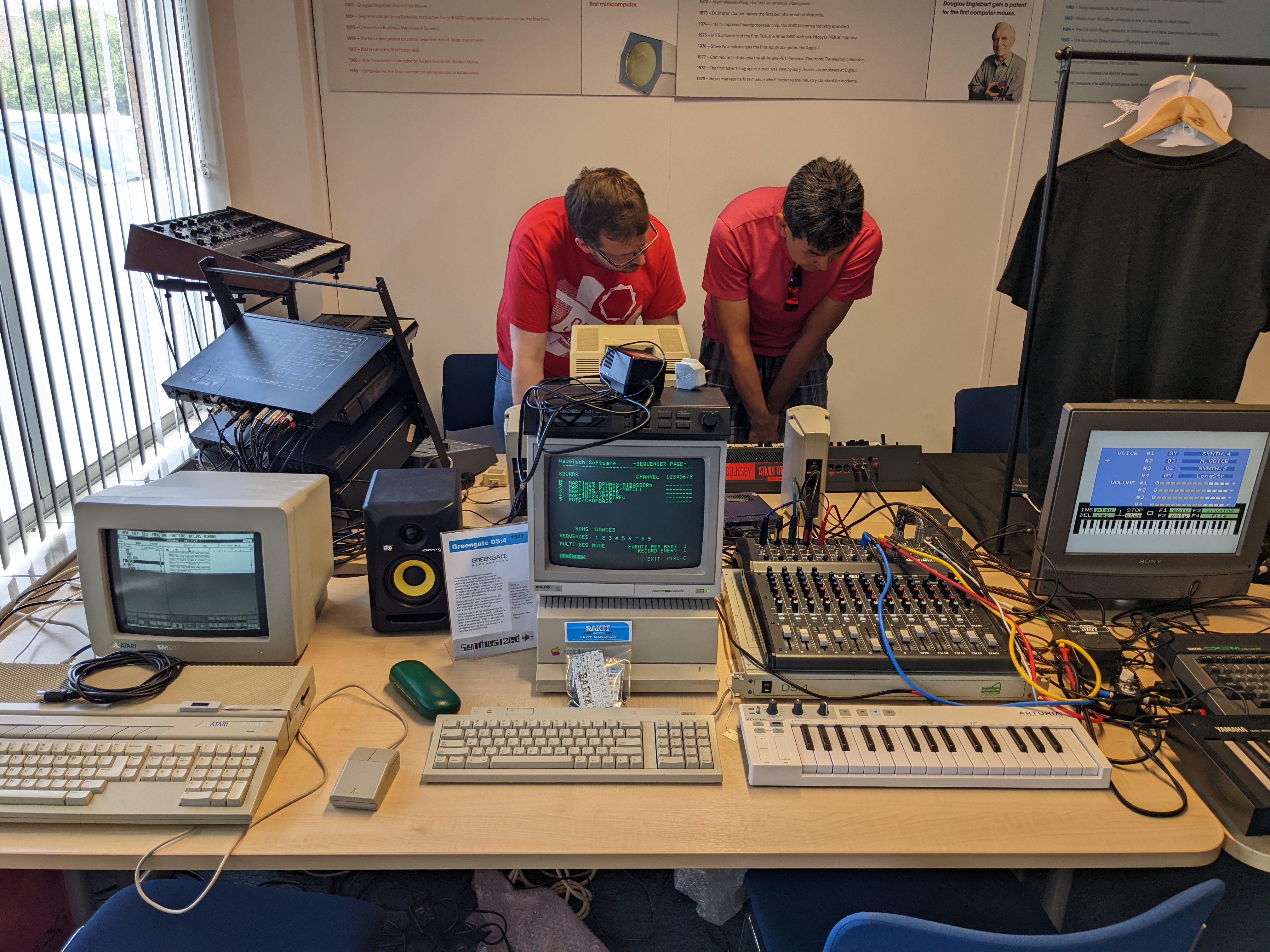
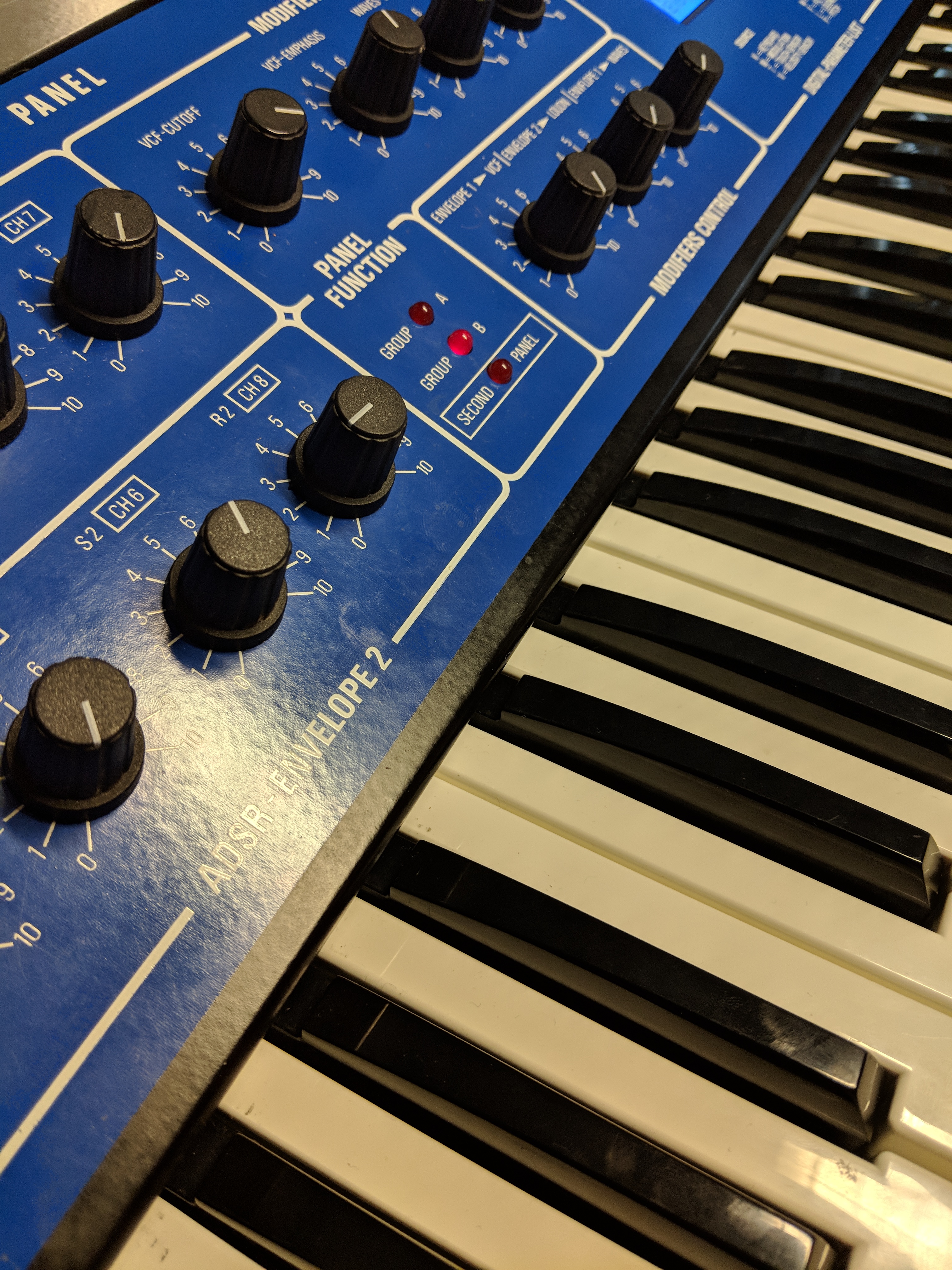
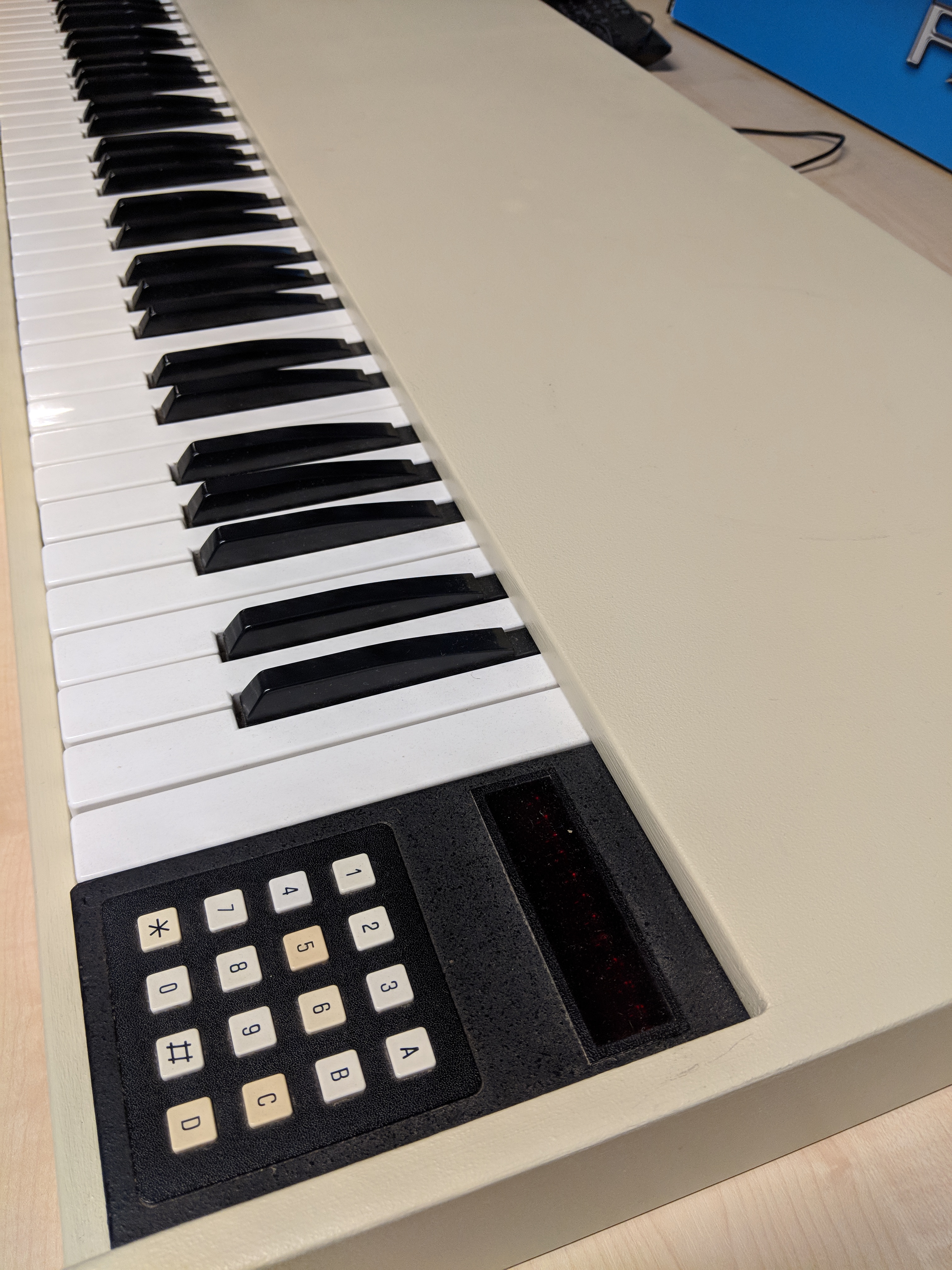
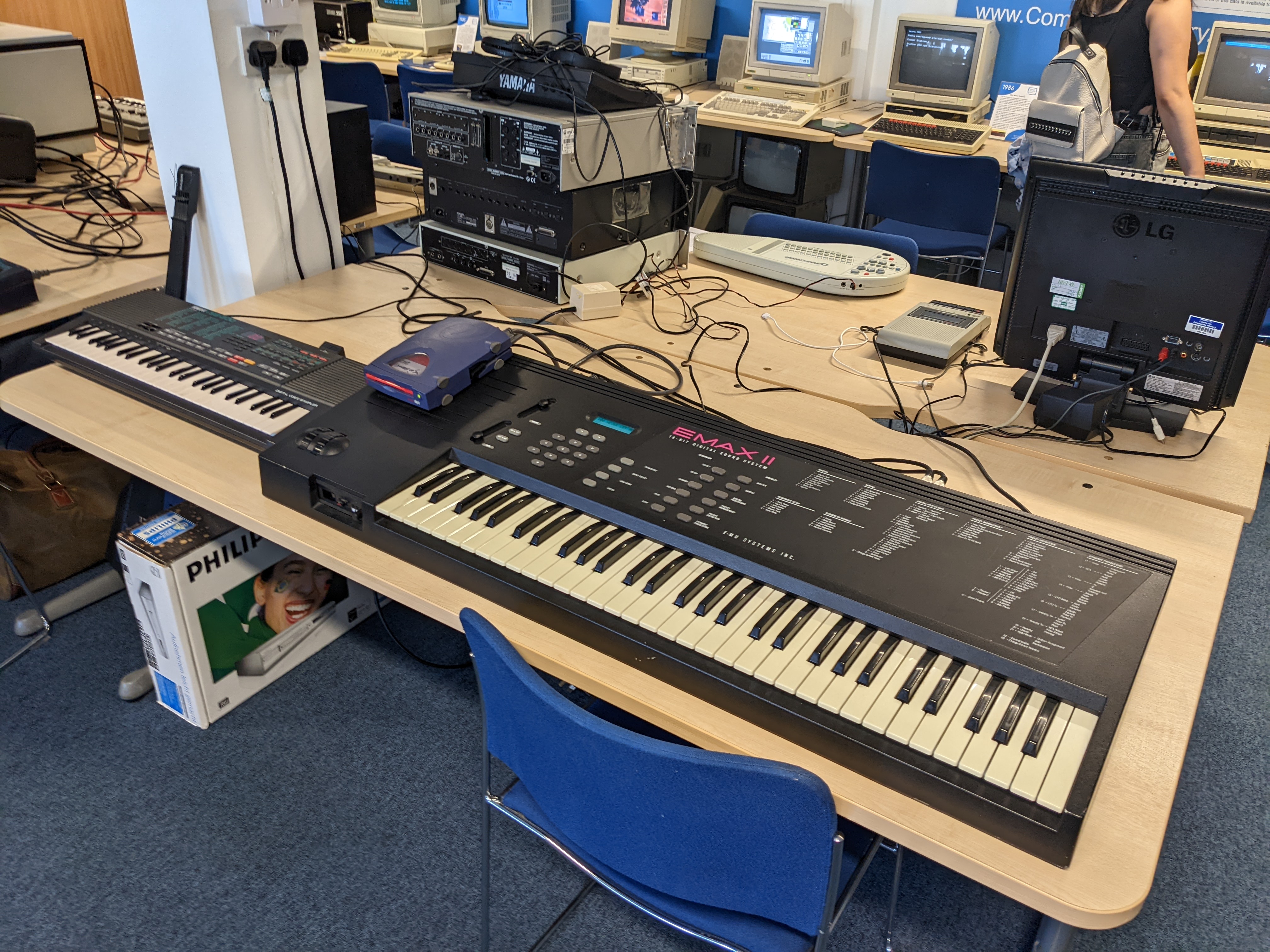
We’ll also have demonstrations of the iconic synthesisers and computer music systems of the 80s and 90s, plus some examples of the very latest technologies too. Keep checking back to see what’s happening!
We'd love you to bring your own synthesisers, music computers, drum machines or anything else you'd think would be of interest. Send a message to tony@computinghistory.org.uk if you'd like to be involved.
Spaces for these exciting hands-on events are limited, so booking is required to ensure your place.
Payment is taken by PayPal immediately. Please print a copy of the receipt that is displayed at the end of the payment process and bring it with you as your e-ticket.
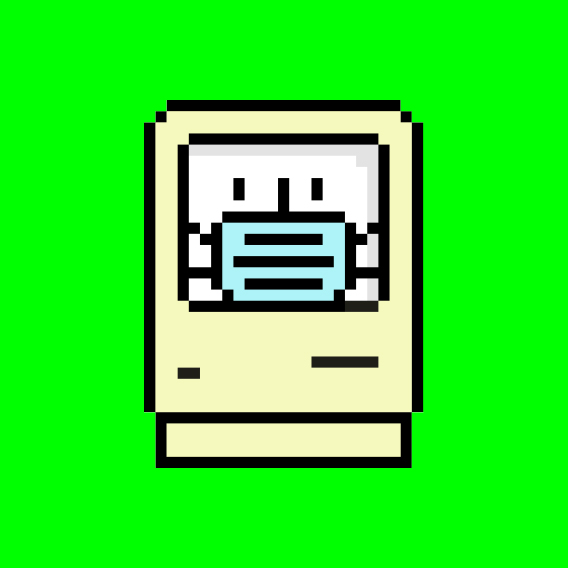 |
We are still maintaining some Covid precautions to protect our staff & visitors.
Hand sanitisers are available throughout the museum. Please wash
your hands regularly when using the machines.
|






